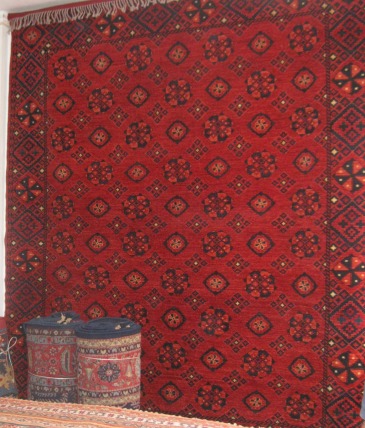On Tuesday, July 10, Barakat interns took a trip to Yayla Tribal Rugs, which is owned by Chris Walter, a co-founder of Barakat. As the interns spread out among the carpets, which are hand-woven and made with traditional vegetable dyes, Walter described the history of Yayla and of Barakat.
Yayla began in 1980, primarily importing rugs from Turkey but then producing its own rugs, in Pakistan, in the mid to late ‘80s.
“I speak Turkish,” Walters said, “so I worked with Turkmen refugees from northern Afghanistan who spoke a close language.” He worked with the Afghan refugees who settled in Pakistan, and helped them recover their traditional nineteenth-century methods of making rugs. Yayla gradually grew bigger as it exported the rugs to Europe and the United States.
Barakat began as Yayla sought to provide education in Afghanistan to the children of those who made the rugs.
“We started Barakat with the hope that it would give back to the community where these rugs are made,” Walter said.
However, the organization quickly ran into a problem—as the Soviets left Afghanistan and the Afghan Civil War began, the country fell into chaos. As a result, Barakat relocated to Pakistan to provide Afghan refugees with work there. After the fall of the Taliban, Barakat embarked on building schools in Afghanistan. Additionally, Barakat started working in India, but had to pull back because of the recession.
Walters also explained a little about rug weaving to the interns. For example, some rugs take four weavers eight months to weave; others take up to eight months. Nepalese rugs look distinctly different from those made in Afghanistan. Currently, about seventy percent of Yayla’s rugs come from Afghanistan, ten to fifteen percent from Nepal, ten percent from India, and only about five percent from Pakistan.
Yayla’s rugs are necessarily pricey: the Internet has made cheap handmade rugs readily available, forcing quality weavings into a relatively upscale market. However, one Barakat staffer did take home a souvenir. Sarah, our communications intern, bought a small, hand-woven rug to take to her dorm room. Karmen, Barakat’s intern coordinator, pointed out her dream rug in the back of the store. “Every time I go back, I look to make sure it hasn’t been sold,” she said.
Yayla and Barakat are successful and still growing. Walter hopes to bring Yayla “back to the level of profit [it saw] in the early 2000s.” As for Barakat, he wants to reopen the schools in India. “We feel like it’s part of our mission to be working in India. The original vision of Barakat was of an organization that acts as a bridge across cultures and religions in South and Central Asia.”

